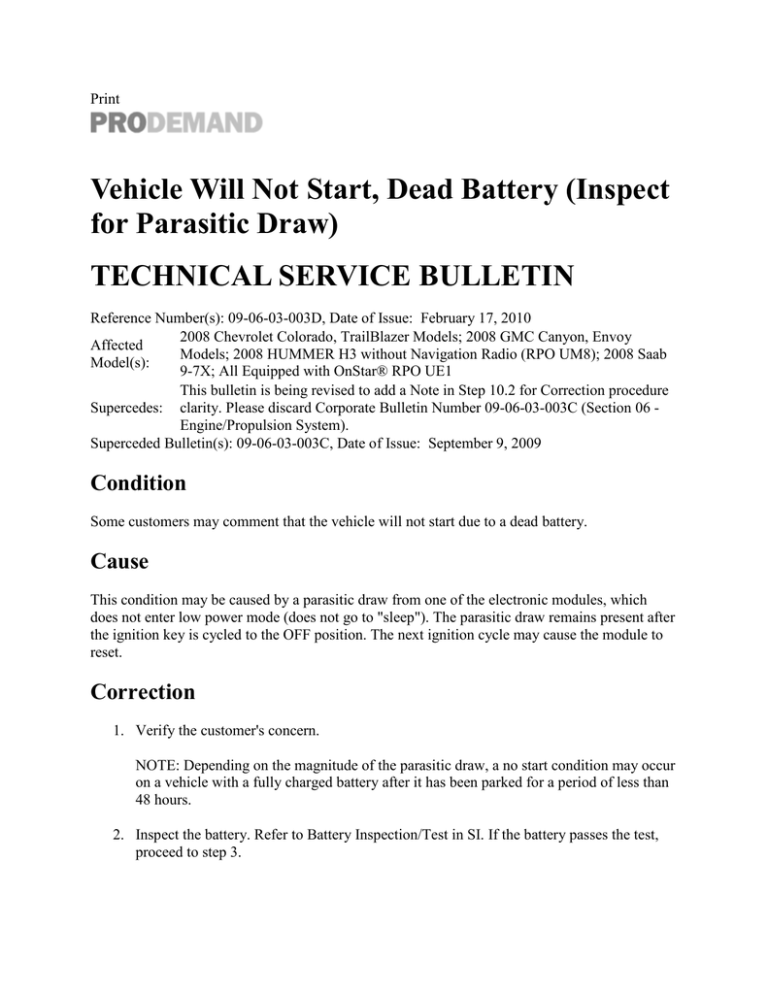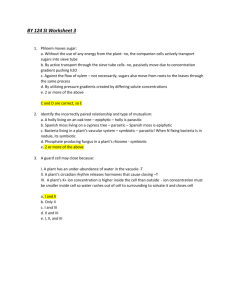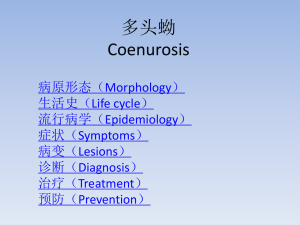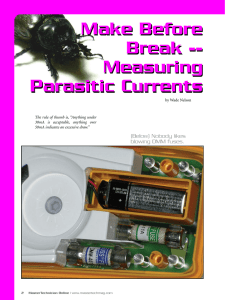Vehicle Will Not Start, Dead Battery (Inspect for Parasitic Draw
advertisement

Print Vehicle Will Not Start, Dead Battery (Inspect for Parasitic Draw) TECHNICAL SERVICE BULLETIN Reference Number(s): 09-06-03-003D, Date of Issue: February 17, 2010 2008 Chevrolet Colorado, TrailBlazer Models; 2008 GMC Canyon, Envoy Affected Models; 2008 HUMMER H3 without Navigation Radio (RPO UM8); 2008 Saab Model(s): 9-7X; All Equipped with OnStar® RPO UE1 This bulletin is being revised to add a Note in Step 10.2 for Correction procedure Supercedes: clarity. Please discard Corporate Bulletin Number 09-06-03-003C (Section 06 Engine/Propulsion System). Superceded Bulletin(s): 09-06-03-003C, Date of Issue: September 9, 2009 Condition Some customers may comment that the vehicle will not start due to a dead battery. Cause This condition may be caused by a parasitic draw from one of the electronic modules, which does not enter low power mode (does not go to "sleep"). The parasitic draw remains present after the ignition key is cycled to the OFF position. The next ignition cycle may cause the module to reset. Correction 1. Verify the customer's concern. NOTE: Depending on the magnitude of the parasitic draw, a no start condition may occur on a vehicle with a fully charged battery after it has been parked for a period of less than 48 hours. 2. Inspect the battery. Refer to Battery Inspection/Test in SI. If the battery passes the test, proceed to step 3. NOTE: Always check for aftermarket accessories (non-OEM) as the first step in diagnosing electrical conditions. If the vehicle is so equipped, disconnect the system to verify that these add-on accessories are not the cause of the condition. 3. Inspect for aftermarket accessories. Refer to Checking Aftermarket Accessories in SI. 4. Colorado, TrailBlazer, Canyon and Envoy models equipped with AM/FM stereo and CD/MP3 player (RPO US8) only - Refer to GMVIS to see if Customer Satisfaction Bulletin 08134 applies. If the vehicle is involved and the bulletin has not been performed, reprogram the radio following the steps in Customer Satisfaction Bulletin 08134. 5. Check for current/history DTCs. Document and clear all DTCs. Disconnect the scan tool. NOTE: When troubleshooting for parasitic draws, be sure to connect the digital multimeter in parallel with the Parasitic Draw Test Switch J 38758 and turn it ON before beginning the test. Failure to do so could cause any module potentially causing a draw to reset. 6. Install a Parasitic Draw Test Switch J 38758 and connect a digital multimeter . Refer to Battery Electrical Drain/Parasitic Load Test in SI. IMPORTANT: The test switch on the J 38758 is marked ON and OFF. When the test switch is in the ON position, the circuit is closed and electrical current will pass through the switch. When the test switch is in the OFF position, the circuit is open and electrical current will not pass through the switch. 7. Turn the Test Switch J 38758 ON and start the vehicle. Allow the engine to idle while in Park for 5 minutes. Turn on all vehicle features and accessories. Cycle through all radio bands, including XM if equipped, and any other available radio features. Attempt, but do not complete, an OnStar® call. Cycle the HVAC modes, power seats and interior lights. Leave the accessories ON except for high load features such as headlamps, heated seats and dome lights. 8. Quickly and in sequence, turn the ignition off, remove the key from the ignition, open the driver's door, exit the vehicle and close the door. Complete these steps in less than 15 seconds. DO NOT reopen the front doors or initiate any Class 2 communication (i.e. RKE lock/unlock) as this could reset any module potentially causing a draw. 9. Wait at least 90 seconds after completing Step 8. Turn the Test Switch J 38758 OFF. With a normal vehicle electrical draw less than or equal to 15 mA, the body control module (BCM) should be in "sleep" mode after 15-20 minutes. 10. If a parasitic draw is observed after 20 minutes, depending on the test results indicated below perform one of the following procedures: NOTE: Fully charge the battery prior to any programming event. 1. For a 350 mA - 400 mA draw with a Current/History DTC U1301 present, remove the OnStar® Vehicle Communications Interface Module (VCIM) fuse. 2. If the parasitic draw drops to 15 mA or less, reprogram the VCIM using SPS. Repeat Steps 7 through 9 to confirm the repair. NOTE: In Step 10.2, for HUMMER H3 models , if the parasitic draw drops to 15 mA or less, repeat the test with the fuse re-installed and the XM Module disconnected. If the parasitic draw is still eliminated by OnStar fuse removal, replace the VCIM. if no parasitic draw is detected, replace the XM module per: instructions in step 10.3. 3. For a 350 mA - 400 mA draw without a Current/History DTC U1301 present, remove the OnStar® Vehicle Communications Interface Module (VCIM) fuse. 4. If the parasitic draw drops to 15 mA or less, replace the VCIM. Refer to Communication Interface Module Replacement in SI. Repeat Steps 7 through 9 to confirm the repair. Order replacement parts directly through an Electronic Service Center (ESC). OnStar replacement units are currently available in the U.S from the Autocraft Electronics (ACTLE) ESC. They can be contacted by either their website (www.autocraft.com) or by phone at 800-336-3998. For Canadian dealers, contact the MASS Electronics ESC at 877-410-6277. 5. For a 200 mA - 1400 mA draw on vehicles equipped with XM radio (RPO U2K) , remove the radio fuse. 6. If the parasitic draw drops to 15 mA or less, repeat the test with the fuse reinstalled and the XM Module disconnected. 7. If the draw follows the XM Module and the vehicle was built prior to February 4, 2008, replace the XM Module with GM P/N 15269740 through a GM authorized Electronic Service Center only. Refer to Bulletin GMP09-043 Updated Warranty & Goodwill Exchange for Electronic Products. For XM Module removal and installation procedures, refer to Digital Radio Receiver Replacement in SI. Repeat Steps 7 through 9 to confirm the repair. NOTE: For Colorado, Canyon and H3 models only - If the customer's habit is to turn the ignition key on and off very quickly, the Regulated Voltage Control Module may stay "awake" waiting for an ECM message to shut it down. 11. To verify this, turn the ignition from OFF to ON to OFF in less than 5 seconds. An oscilloscope will show a 100 mA - 400 mA fluctuating parasitic draw. The digital multimeter in auto range mode may show a 100 mA - 230 mA consistent draw. 12. If the parasitic draw can be identified through this test, reprogram the engine control module (ECM). 13. Verify that the vehicle is repaired. Parts Information *DO NOT OBTAIN PARTS FROM GMSPO. CONTACT A GM AUTHORIZED ELECTRONIC SERVICE CENTER (ESC) FOR REPLACEMENT. Parts Information Part Number Description 15835455* OnStar Module 15269740* XM Module Warranty Information (Excluding Saab US Models) For vehicles repaired under warranty, use: Warranty Information (Excluding Saab US Models) Labor Operation Description Labor Time R9755* Inspect/Test Battery for Parasitic Drains 1.0 hr Add Reflash VCIM 0.3 hr Add Replace VCIM 0.6 hr Add Replace XM Module 0.5 hr Add Reflash ECM Module 0.3 hr *This is a unique labor operation for bulletin use only. It will not be published in the Labor Time Guide. Warranty Information (Saab U.S. Models) For vehicles repaired under warranty, use: Warranty Information (Saab U.S. Models) Labor Failed Fault/Reason Location Warranty Repair/Action Operation Description Object Code Code Type Code Inspect/Test 3691006* Battery for 36910 61 0 01 01 Parasitic Drains Add Reflash VCIM 05 3691007* Add Replace VCIM 01 3691008* Add Replace XM 01 3676201* Module *This is a unique labor operation for bulletin use only. It will not be published in STM. Labor Time 1.0 hr 0.3 hr 0.6 hr 0.5 hr




